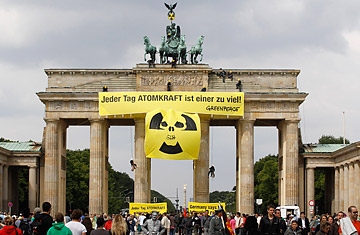
Greenpeace activists hang a banner on Berlin's Brandenburg Gate on May 29, 2011, to protest the use of nuclear power

This post is in partnership with Worldcrunch, a new global news site that translates stories of note in foreign languages into English. The article below was originally published in Die Welt.
BERLIN — The biggest advantage of democracy is the possibility of getting rid of governments you don't like in a peaceful way. That doesn't sound like much. Yet it sums up all the wisdom and beauty at the core of a democratic system. In a democracy, you can say A, but you can also say B, just as you can rely on the assumption that nothing has to last forever. Everything can be changed, amended, courses reversed. In short, the very life and soul of democracy is that there are always other options.
Germany's federal government is now abusing that basic rule in a scandalous way. There can be no doubt that the country needs to be looking at a smart mix of different energy sources for the future, and that developing viable alternatives to atomic power is an urgent necessity. Yet the manner in which the federal government has rushed to its decision to put a definitive stop to the use of nuclear energy by 2022 runs counter to all rules of democratic procedure. It began when, for politically motivated and tactical reasons alone, the government went back on the agreement made last fall — just seven months ago — to extend the life span of nuclear power plants. After the Japanese plant Fukushima began leaking radiation, it felt compelled to cede to public pressure by making a rapid move away from atomic power. Backtracking in the blink of an eye, the government moved so quickly partly out of fear of the Greens, and entirely without discussion or reflection.
The Swiss Energy and Environment Minister Doris Leuthard — who had the determining vote in her government's decision not to build any more atomic power plants and to stop the use of nuclear energy by 2034 — stated: "The change needs time, but we also have time." That deliberate tone is sorely missed in Germany. From the Christian Social Union to the greenest of the republic's Greens, over the past few weeks it's as if everyone is trying to outdo everyone else in signing the death warrant on nuclear power. It's a climate that only engenders more excitability, not good sense.
Why the rush?
It is rather astonishing to see how radically the federal government has avoided examining alternative solutions on this issue. Indeed, such an evasion of a debate on the so-called Fukushima Package, which comes up for parliamentary vote on July 8, could be said to skirt legality. Hans-Jürgen Papier, a former president of Germany's Federal Constitutional Court, not known for making unconsidered remarks, called the moratorium an "illegal measure" and something that "[German Chancellor] Angela Merkel, the magician, pulled out of her hat like a rabbit a couple of days after Fukushima." There was no reaction from Berlin.
The Federal Network Agency, also not known for rash pronouncements, stated that consequences of the moratorium would be "questionable in terms of the energy industry, economically inefficient and ecologically damaging" — again, no reaction from antinuclear Berlin, which steamrolled right over it.
And nobody really seems to be perturbed that the body created by Merkel to wind down the use of nuclear power has impertinently been assigned the name of Ethics Commission — as if the issue at stake were an ethical one, and not one of practical and technical common sense. Supporters of atomic energy comprise a tiny minority of the 17-person commission, and within the government only the most faint voices can still be heard raising a timid "But? ..." What a wonderful victory for the robust give-and-take that nurtures democracy!
And then there's Europe. When a founding E.U. member as powerful as the Federal Republic of Germany wants the continent and the rest of the world to head down a new energy path, then it would be vital not only for that member to take the matter up at the European level, but to give it time — we need time, and we have it. Germany has shown no respect for the energy policies of other E.U. countries, and particularly no trace of consideration for the East-West split that exists in Europe over nuclear power. Instead, Germany has chosen to go it alone on this issue, assuming a kind of avant-garde, "moral high ground" role that is not always going to play well elsewhere.
Sustainability also means not getting caught up in the fluster of every passing pressure. It means taking time, in the clear knowledge that a "no" to nuclear power does not constitute an answer to the complex question of how to find viable future sources of energy.
Weighing the pros and cons, hearing out the opposition, putting things in longer-term perspective: we're not seeing any of this. Instead, there is an unholy alliance between those who want to "govern without hindrance" and those who would usurp the will of both Parliament and the people in favor of morally charged environmental pressure. In a rational Germany, haste on such weighty issues should not be tolerated.
Also from Worldcrunch:
Silvio Berlusconi: Is the Magic Gone?
— La Stampa
In France, A Muslim Offensive Against Evolution
— Le Monde
Blood, Justice and Corruption: Why the Chinese Love the Death Penalty
— Economic Observer
